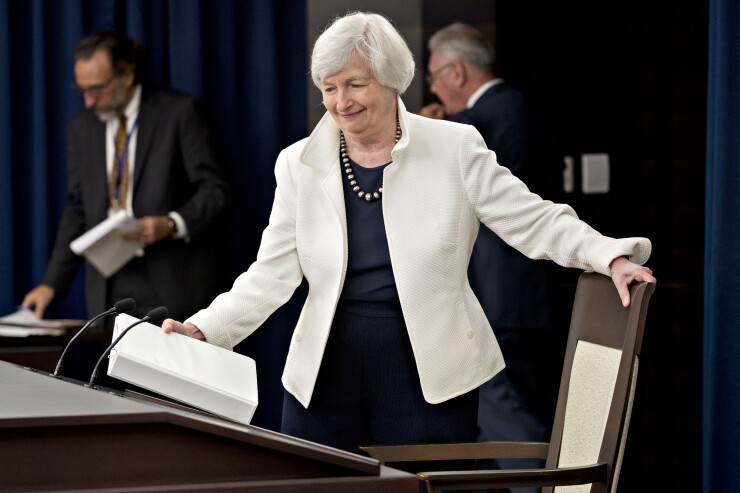Former Federal Reserve Chair Janet Yellen says the central bank should consider deliberately courting an economic boom to make up for a bust by promising to keep interest rates “lower-for-longer” after they are cut to zero.
In a paper for presentation Friday at the Brookings Institution in Washington, Yellen said such an approach would commit the Federal Open Market Committee to compensate for its inability to reduce rates below zero by holding them at lower levels longer than would be otherwise justified after the economy recovers.

“This strategy enables the Fed to provide substantial additional accommodation during zero lower bound episodes,” she said.
That’s important because Fed research suggests that those episodes will occur much more frequently in the future, in part because low productivity growth and an aging society will help keep rates much lower throughout the economic cycle than they have been in the past.
Some economists have urged policy makers to raise or modify their inflation targets in order to push up nominal interest rates, giving them more room to fall in a downturn.
Yellen joins another former Fed chairman, Ben Bernanke, in advocating for a strategy that would change central bank behavior temporarily, when rates hit zero.
“The Fed, during a zero lower bound period, could keep track of the cumulative deviations of short rates from the recommendations of a simple rule (the Taylor rule) and then ‘work off’ or ‘make up’ these accommodation shortfalls over time by holding short rates lower for longer than the rule would recommend,” she said.
“If the strategy is understood and credible, it should cause long-term rates to decline when the zero lower bound begins to bind by about as much as would occur in the absence of any effective lower bound at all,” she added.
Yellen acknowledged the approach could lead to an economic “boom.”
“Market participants could well question whether the FOMC would allow the economy to ‘overheat’ and might see an incentive for the FOMC to renege,” she said. “Incorporating a set of widely supported principles into the FOMC’s strategy statement would ameliorate this problem.”
Yellen departed the U.S. central bank in February after four years at the helm and more than 15 years of public service. She took the job when the Fed’s benchmark interest rate was effectively zero.
During her tenure as chair, unemployment in the U.S. fell to 4.1% from 6.7% and inflation remained in check. Despite that, President Donald Trump broke from past practice in opting not to offer her a second term as chair. Instead he appointed Republican Jerome Powell, who had served as a Fed governor since 2012. Yellen is now a fellow at Brookings.
“This strategy enables the Fed to provide substantial additional accommodation during zero lower bound episodes,” she said. It “promises, in effect, to allow the economy to boom” once the recession ends.
Fed research suggests that the zero lower bound episodes will occur much more frequently in the future, in part because low productivity growth and an aging society will help keep rates much lower throughout the economic cycle than they have been in the past.
For the strategy to work best, the Fed needs to make a “credible statement” endorsing it before the next economic downturn hits, Yellen said. The central bank could complement that by emphasizing that such an approach would likely result in a period of “exceptionally low unemployment” and inflation above its 2% target.
Bernanke, who preceded Yellen atop the central bank, has suggested what in effect is another variation of the strategy.
Under his approach, the central bank would commit to hold rates at zero until the cumulative shortfall in inflation below its 2% target during the recession has been eliminated and unemployment has at least declined to its so-called natural rate.
Yellen acknowledged that the strategy she put forward carries some risks.
“A prolonged period of inflation above 2% could potentially unanchor inflation expectations and prolonged ‘boom conditions’ could undermine financial stability,” she said. “These concerns may militate in favor of some ‘tempering’ of the application of a lower-for-longer approach.”





